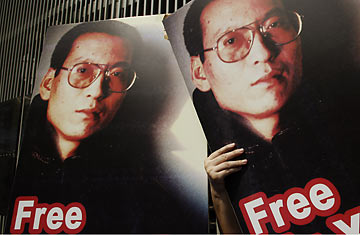
Posters in support of Chinese dissident Liu Xiaobo
The verdict against the enemy of the Chinese state came down on Christmas Day, not a particularly significant holiday in the calendar of the People's Republic but one that perhaps meant that Beijing wanted as little attention on it as possible in the West. Following a two-hour trial on Dec. 23, the literary critic Liu Xiaobo was sentenced to 11 years in prison in Beijing No 1 Intermediate People's Court. His crime: writing a series of essays questioning the monopoly on power of the Communist Party as well as compiling a manifesto demanding political reform and increased democracy. The ruling said Liu was guilty of "inciting subversion of state power," a charge the government usually reserves for the political activists it dislikes most.
Liu was arrested one year ago, just before the release of Charter 08, a manifesto signed by 303 Chinese intellectuals that called for extensive reforms of the country's political system. While dozens of signers were detained, put under surveillance or otherwise harassed by authorities, Liu is the only one to face prison time. Charter 08 received no coverage within China but, after its release in December 2008, thousands Chinese within the country and overseas signed the petition online, a situation that embarrassed the Chinese government so soon after coming off the highs of its Olympic spotlight.
Liu's trial had already prompted close scrutiny from several western governments, including the United States. Diplomats had not been allowed into his trial on Wednesday. On Tuesday U.S. State Department spokesman Philip J. Crowley said, "As far as we can tell, this man's crime was simply signing a piece of paper that aspires to a more open and participatory form of government. That is not a crime." China's Foreign Ministry on Thursday called all criticism of Liu's trial "gross interference in China's internal affairs."
Human rights groups say the length of Liu's sentence is the longest they've seen for a subversion charge, a harsh punishment meant to warn other activists. "The explicit message being sent is: we are brooking no challenge, no further dissent of this nature and if you continue, this is the consequence. It's the old 'kill the chicken to scare the monkeys' routine," says Joshua Rosenzweig, a Hong Kong-based official with the Dui Hua Foundation, a human-rights group. "The implicit message or unintended message is the government is very, very afraid of allowing any sort of discussion or challenge to its supremacy and the Party's supremacy."
"The verdict was completely outrageous," says Liu's wife, Liu Xia. "I have nothing to say to this unreasonable government." She was allowed to attend the sentencing Friday with her brother (she had been barred from attending the trial on Wednesday). Liu Xia said she spoke briefly with her husband after the sentencing about family matters. She says that he was composed throughout the hearing. She expects he will appeal the verdict, but no decision has been made.
Liu, 53, was a visiting scholar at Columbia University when the Tiananmen Square demonstrations gripped China in the summer of 1989. He returned home to join student hunger strikers, and was jailed for 20 months after the government's bloody crackdown. He was later sentenced to three years in a labor camp beginning in 1996 for further questioning China's one-party system. Along with Hu Jia, who was sentenced to three-and-a-half years in prison on a subversion charge in 2008, Liu was one of the most prominent dissidents active in mainland China.
Liu's conviction and sentencing, say human rights groups, is evidence that beneath China's pretensions of modernity is the old, intolerant authoritarianism, albeit gussied up with legalisms. "The Chinese government's decision to sentence Liu Xiaobo to 11 years in prison on subversion charges is a travesty of justice and reflects yet again the government's willingness to use the law as a weapon to silence dissent," Phelim Kine, an Asia researcher with New York-based Human Rights Watch, wrote after the verdict. "The severity of Liu's sentence puts the lie to the government's lofty rhetoric on commitment to rule-of-law and human rights."
The rulers of China may not commemorate Christmas and may have cynically picked the day to pass judgment on Liu to avoid Western media attention. But they may have given the people they wish to silence a new code word for anger. In the Twitterverse, Chinese language tweets have now paired Liu's fate and shengdan, the Chinese words for the birthday of Christ. From now on, Christmas will have a separate meaning for dissidents in China. It will be their day to commemorate Liu Xiaobo.
